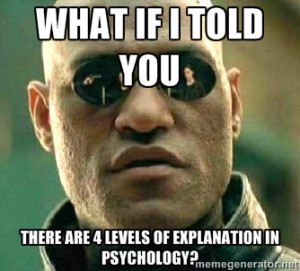
October 9, 2013, by Yvonne Teoh
3rd Year Modules: Evolution of Brain and Behaviour
Continuing with the series of introducing third year modules…
To start things off, I am going to try to answer two very different questions:
1) Why is a mother breastfeeding her child?
2) How did Malaysia revolutionise psychology, but get no credit for it?
How do these questions relate to my module? Keep reading and you will find out!
First, imagine someone asks you why a mother is breastfeeding her child. How would you as a psychologist answer that question? Maybe you would give a social psychology answer: her baby is crying, and her attachment to the child means that she feeds him to make him happy. Maybe you give a cognitive answer: cognitive mechanisms associate crying behaviour with hunger, so she breastfeeds him to make him stop crying. Or even a cognitive neuroscience answer: the baby’s crying causes brain areas associated with sympathy and distress to activate in the mother, causing her to initiate breastfeeding. All of those are good answers, but all of them operate on the same “proximate” level of explanation. They describe the mechanism that caused a stimulus to cause a behaviour.
The developmental psychology enthusiasts among you might give a different kind of explanation. When the mother was a child, her mother breastfed her, and as she grew up, she saw other mothers breastfeeding children, so now she is a mother herself, she breastfeeds her own child. This is an explanation on another level: the “ontological”, which is just a fancy word for developmental.
Now, what if I told you there are two more levels of explanation – ones that you may never have heard of before! To understand what they are and why they are so important, we will answer question 2. How did Malaysia revolutionise psychology, but get no credit?
Most people have heard of Charles Darwin. He was an English scientist who lived around 150 years ago, and who discovered the theory of evolution by natural selection. What this theory says is that: 1. There is variation in a population (some giraffes are taller than others and can eat from the tops of the trees); 2. Some of this variation is heritable (genes for being tall or short are passed from parent to offspring) and 3. Some of these genes are passed on more than others (taller giraffes don’t starve if there is a drought because they can reach the high leaves, and live to have more offspring. Genes for being tall become more frequent in the population). Over millions of years, these changes in the frequency of genes in the population change the population – giraffes get taller, elephants get bigger, stupid apes become cleverer. What most people don’t know is that this theory was also discovered at the same time by a man named Alfred Russell Wallace, who lived in Sarawak. But because Darwin was in London and Wallace was not, Darwin is famous and Wallace is forgotten.
When psychologist Niko Tinbergen heard about this theory of evolution, he realised that there are more levels of explanation that can be used to answer questions about human behaviour. These levels are called the “phylogenetic” and the “ultimate” levels. The phylogenetic explanation uses our place in nature to answer the question. Why is a mother breastfeeding her baby? Because she is a human. Humans are mammals, so females produce milk to feed their offspring. Finally, the ultimate explanation. Why is the mother breastfeeding her child? Because milk contains all the nutrients required to help a baby grow up big and strong. By making sure her baby survives and reproduces, she makes sure that her genes – including the genes for breastfeeding – are passed on and become more common in the next generation.
So, why should every psychology student study evolutionary psychology? Because it gives us four levels of explanation instead of just two. It allows us to understand human behaviour more fully. It allows us to understand human behaviour in a much deeper way – rather than just knowing the mechanisms that directly cause behaviours, we can understand the ultimate reasons for why people behave the way we do. These new levels of explanation can be applied to all sorts of behaviours. In C83 EVO: Evolution of brain and behaviour, we learn about why people cooperate with each other, and why sometimes they are aggressive to each other; why parents care for their children, and why sometimes they neglect or even abuse them; how people choose romantic partners; how culture evolved, and why different people have different cultures; and how we can apply this new knowledge in psychiatry, in business, in charities and in the world. That’s why all psychology students should study evolutionary psychology.
Dr Ian D Stephen,
(Assistant Professor, School of Psychology, UNMC)
-
Post a comment

